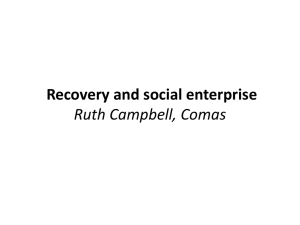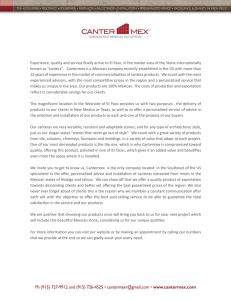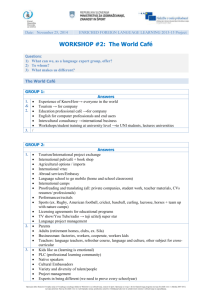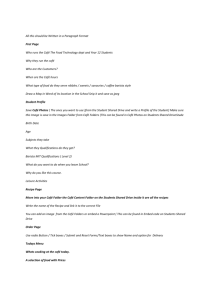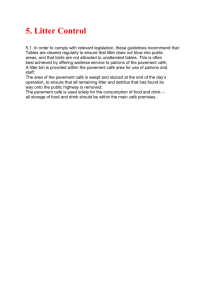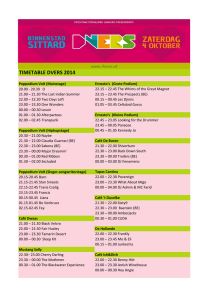Business Plan Template For Community Internet Cafes
advertisement
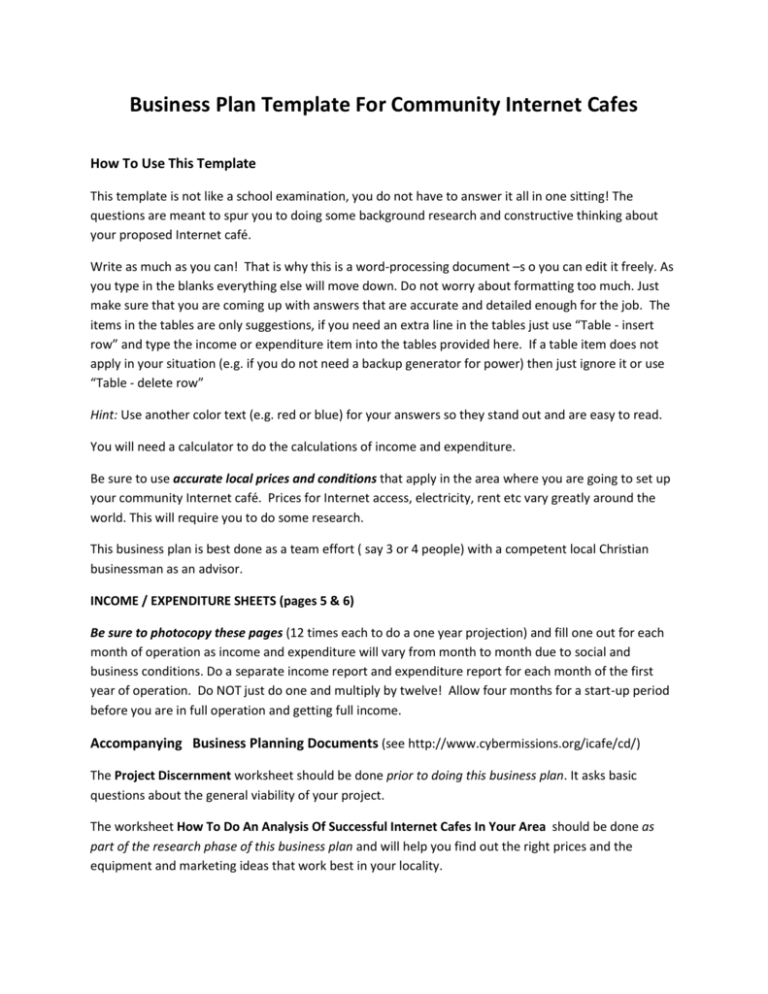
Business Plan Template For Community Internet Cafes How To Use This Template This template is not like a school examination, you do not have to answer it all in one sitting! The questions are meant to spur you to doing some background research and constructive thinking about your proposed Internet café. Write as much as you can! That is why this is a word-processing document –s o you can edit it freely. As you type in the blanks everything else will move down. Do not worry about formatting too much. Just make sure that you are coming up with answers that are accurate and detailed enough for the job. The items in the tables are only suggestions, if you need an extra line in the tables just use “Table - insert row” and type the income or expenditure item into the tables provided here. If a table item does not apply in your situation (e.g. if you do not need a backup generator for power) then just ignore it or use “Table - delete row” Hint: Use another color text (e.g. red or blue) for your answers so they stand out and are easy to read. You will need a calculator to do the calculations of income and expenditure. Be sure to use accurate local prices and conditions that apply in the area where you are going to set up your community Internet café. Prices for Internet access, electricity, rent etc vary greatly around the world. This will require you to do some research. This business plan is best done as a team effort ( say 3 or 4 people) with a competent local Christian businessman as an advisor. INCOME / EXPENDITURE SHEETS (pages 5 & 6) Be sure to photocopy these pages (12 times each to do a one year projection) and fill one out for each month of operation as income and expenditure will vary from month to month due to social and business conditions. Do a separate income report and expenditure report for each month of the first year of operation. Do NOT just do one and multiply by twelve! Allow four months for a start-up period before you are in full operation and getting full income. Accompanying Business Planning Documents (see http://www.cybermissions.org/icafe/cd/) The Project Discernment worksheet should be done prior to doing this business plan. It asks basic questions about the general viability of your project. The worksheet How To Do An Analysis Of Successful Internet Cafes In Your Area should be done as part of the research phase of this business plan and will help you find out the right prices and the equipment and marketing ideas that work best in your locality. OBJECTIVES What are your three (or so) main objectives in starting the Internet café? What do you hope to achieve? What spiritual outcomes do you wish to achieve? How much money do you want to make? Who do you want to be involved? Where do you want to set up your Internet café? When do you want to have it up and running? How long do you want to operate it for? LOCATION Can you locate the Internet café near a school, college, hospital or business district? Is locating the icafe in a mall a possibility? INTERNET ACCESS Is there Internet access in your area? What kind/s? - DSL, cable, dial-up, satellite, microwave link, VHF,…. How much bandwidth is available? How much does it cost? REGULATORY How long does it take to get a business license in your area? How much does it cost? If you are importing the computers – what is Customs like? Do you have someone who can help you with Customs? Ho w will you comply with the relevant tax laws in your area? Are there other laws / regulations that you need to be aware of? PEOPLE Do you have a good computer technician who can help you to set up and maintain the Internet café? Do you have a good entrepreneur / businessman who can help you make the Internet café profitable? Do you have a personal evangelist / church worker/ community worker who can make the icafe transformational in the community? Do you have high level church and business leaders who can supervise you and assist you? Are there people committed believers in Jesus Christ? Are the wise and confidential? Are they committed to your Internet café project for the long term? RESOURCES Where can you get resources for free: computers, software, furniture, monitors …. ? Can you get a local church involved? Can you get some donors involved? Make up a list of people you know that might be able to help? Do these people also know other people who might be able to help? Are there government agencies that can help you? Can you get grant funding? Can you borrow money at zero (or low) interest? START UP COSTS Hint: Use the Comments column to list ways you can save money - such as people who might donate the item or a store that is selling it cheaply at the moment. ITEM Rent / Bond Government licenses Putting on electricity Putting on Internet Installing a phone line Power back-up / Generator? UPS / surge protectors Server Computers / thin clients LCD monitors Cabling, hub, networking Keyboards, mice, mousepads Extra RAM needed Headsets Webcams LCD projector (for training) Windows 2003 server software Other software licenses CD / DVD burner Wireless Router Laser printer Multifunction printer /scanner Backup – external HDD Furniture (tables, chairs, etc.) Décor / wallpaper/ paint Coffee making equipment Other accessories Other costs?? TOTAL COST COMMENT INCOME PER MONTH ITEM Price Charged Amount Sold Per Day Income Per Day (multiply price charged by amount sold) Income Per Month (multiply income per day by days open per month) Internet Access Laser Printing Color Printing Photo Printing VOIP / Skype Webcam use Scanning Photocopying CD /DVD Burning Coffee Snacks Headsets Floppy Disks Computer Classes Other Classes Ministry Donations TOTAL INCOME CALCULATING INTERNET INCOME How many computers will be available for customers to use? On average, how full do you expect the Internet café to be – 25%, 40%, 50%, 60%, 75%, 90%, 100%? How much will you charge per hour? How many hours per day will you be open? How many days per month will you be open? Now multiply these numbers e.g if 20 computers, 60% occupancy, $1 per hour, 12 hours per day, 24 days per month (6 days a week) = 20 x 0.6 X $1 x 12 x 24 = $3456 per month (you can state the percentage occupancy as a decimal e.g 60% = 60/100 = 0.6 ) Calculating Other sources Of Revenue (charging standard commercial prices in your area) [Formula: amount used per day x cost of service x days open per month e.g. Laser Printing: 200 pages a day x 10c per page x 24 days open per month = $480 per month e.g. Computer classes: 10 students per day x $5.00 each x 24 days = $1200 per month e.g. CD Burning: 8 CDs per day x $3.00 each x 24 days =$576 per month MONTHLY EXPENSES / OVERHEADS (Formula: Cost Per Item x Amount Used Per Month = Cost Per Month) Hint: Be sure to use your local data and prices here – do some research first, even ring up companies listed in the telephone book and ask them! Some items will have monthly bills e.g. Internet access, electricity, if so just enter the amount in the right hand Cost Per Month column and ignore the middle columns. Frequently used items such as paper might be easiest to estimate as amount used per day. Other items are sometimes easier to estimate on a monthly basis. Just use the middle columns as you feel most comfortable doing. Depreciation should be 3% of the value of your assets per month. Computer repairs – estimate what you will need over a year and divide by 12. Professional fees = accountant, book-keeper, lawyer etc. Feel free to add or remove items on the list as relevant to your situation. ITEM Rent Internet access Telephone / Fax Electricity Water Gas Transport Computer Repairs Depreciation Interest on Loans Professional Fees Marketing / Flyers Software licenses Virus checking Paper CDs / DVDs Laser Toner Printer Ink Office bits & pieces Coffee Food / Snacks Other Items Government Fees Membership fees Sales Tax / GST Wages Income Tax Health coverage Other benefits Cost Per Item (No. Used Per Day) No. Used Per Month Cost Per Month TOTAL PROFIT & LOSS Statement 1. Take the set up costs you calculated on page 4 and put them in the first Expenditure column and in the first Profit / Loss column (as your income at start up is zero) 2. Enter the month by month income you calculated on page 5 under Income in the relevant Monthly Operation section. 3. Enter the month by month expenditures you calculated on page 6 under Expenditure in the Monthly Operation column 4. For each month under MONTHLY OPERATION, do (Income minus Expenditure) to get the profit or loss for that month and enter it in the right-hand Profit/Loss column ITEM SET UP COSTS (page 4) MONTHLY OPERATION 1st 2nd 3rd 4th 5th 6th 7th 8th 9th 10th 11th 12th TOTAL INCOME EXPENDITURE PROFIT / LOSS CASH FLOW STATEMENT (read carefully!!) 1. 2. 3. 4. 5. 6. 7. 8. 9. A cash flow statement helps you see how your total amount of cash is going and especially if you are going to run out of cash at any point in the year. Cash is like oxygen for a business and you need it to survive. If you run out of cash you will need to borrow money to make it through. In the first section enter your Cash In Bank At Start (the mount you have to invest at the beginning) then subtract the set up costs from it. This will give you the amount of cash on hand you have to commence operation Cut and Paste the Profit/Loss monthly figures from page 7 (right hand column for each month, do not include total or setup costs sections), into the monthly Profit/Loss section on the table below. For the 1st month the formula is to take Cash On Hand To Commence Operations and then add that month’s profit (or subtract that month’s loss) from it) this will give you the cash on hand at the end of the first month. For instance if your Cash On Hand To Commence Operations is $2500 and you make a $1000 loss in the first month, you then have $1500 cash on hand at the end of the month, OR if your Cash On Hand To Commence Operations is $2500 and you make a $500 profit in the first month you have $3000 cash in hand at the end of the first month. For each subsequent month just add the profit (or subtract the loss) from the previous months figure: e.g. 2nd month cash in hand = 1st month cash in hand plus profit for second month Do not total up the cash on hand column, it is a running total and does not need to be added up at the end. AMOUNT CASH ON HAND PROFIT / LOSS CASH ON HAND cont’d STARTING OUT CASH IN BANK AT START Minus SET UP COSTS Cash in Hand to Commence Operations MONTH 1st 2nd 3rd 4th 5th 6th 7th 8th 9th 10th 11th COMMENTS 12th Understanding The Cash Flow Report The Cash Flow Statement shows whether you will have a cash flow crisis (run out of money) during the start up phase before you become profitable. 1. If you have plenty of cash in bank at start you will be OK, it will see you through. 2. The extra amount you might need is the largest cash flow deficit that you project occurring. 3. So if the largest cash flow deficit you foresee a $1500 cash flow deficit in month four, this is the extra amount you should raise at the start to ensure you do not get below zero in month four. 4. Otherwise you have two alternatives: a) reduce costs or b) increase revenue 5. Go through your business plan and find how you can reduce costs 6. Go through your business plan and find ways to add sources of revenue 7. In a worst case scenario you may need to borrow money. This should be avoided if at all possible. Marketing Plan How will you get customers to come to your Internet café? How will you get customers to like the service in your Internet café? How will you maintain customer loyalty and keep them coming back to your Internet café? How can you use free / low cost methods to get the word out? Media Word of Mouth Networking Flyers Posters Shop Signage Membership cards Discount Cards Newspaper ads Magazine ads Radio ads Website Google Ads Yes No Maybe Creative Idea Cost Be sure to enter these costs in the marketing/Flyers line of Monthly Expenditure (page 6) Discounts are an absolute last resort as they can eat away at your profit margins and cash flow Compete on quality not on price – a great product /service is the best promotional tool! Start with some initial paid publicity then use word of mouth / organic growth Develop a professional looking logo and shop sign to start with.

